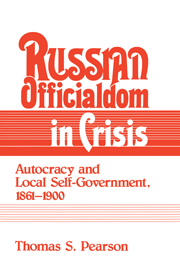Book contents
- Frontmatter
- Contents
- Preface
- Acknowledgments
- 1 Introduction: old problems, new principles – tsarist government and the Great Reforms
- 2 The birth of a new rural order: the state and local self-government, 1861–75
- 3 The breakdown of tsarist administrative order, 1875–81
- 4 The debate revived: state, social change, and ideologies of local self-government reform, 1881–5
- 5 State control over local initiative: the Land Captain Statute of 1889
- 6 The politics of the zemstvo counterreform, 1888–90
- 7 Conclusion
- Select bibliography
- Index
3 - The breakdown of tsarist administrative order, 1875–81
Published online by Cambridge University Press: 08 October 2009
- Frontmatter
- Contents
- Preface
- Acknowledgments
- 1 Introduction: old problems, new principles – tsarist government and the Great Reforms
- 2 The birth of a new rural order: the state and local self-government, 1861–75
- 3 The breakdown of tsarist administrative order, 1875–81
- 4 The debate revived: state, social change, and ideologies of local self-government reform, 1881–5
- 5 State control over local initiative: the Land Captain Statute of 1889
- 6 The politics of the zemstvo counterreform, 1888–90
- 7 Conclusion
- Select bibliography
- Index
Summary
Of the many documents depicting the corrupt, ramshackle state of peasant self-government during the period 1875 to 1881, few were more critical in their description than the memorandum of peasant Mikhail Aleksandrov. “What kind of volost' elder can we have,” he complained, “when the office is attained by means of vodka?” The memorandum, submitted to the minister of internal affairs in 1881, attacked the drunkenness, bribery, and various forms of intimidation that occurred during peasant elections, village meetings to repartition communal land, and volost' court deliberations. It blamed peasant officials for the empty grain warehouses during recent food shortages. To protect peasants from their elected officials (a request made in other peasant memorandums of the period), Aleksandrov pleaded for government control over peasant self-government. “It would be most advantageous to the government and the peasants,” he emphasized, “to abolish the system of elected peasant self-government and to allow each district bureau [for peasant affairs] to appoint volost' and village officials and scribes from among the peasants.”
Aleksandrov's memorandum provides not only rare evidence of peasant literacy, but also a peasant's viewpoint of a problem that aroused widespread concern in the government at the end of the 1870s. The administrative and fiscal anarchy of local self-government, the extent of which was revealed by the senatorial inspections of 1880–1 (and other official reports of the late 1870s), was the impetus for the reforms of local government elaborated in the 1880s. Although historians have alluded to the inefficiency of local administration in the late 1870s and acknowledged that “the reorganization of local government was among the pressing issues of the day,” few of them have analyzed these shortcomings in detail.
- Type
- Chapter
- Information
- Russian Officialdom in CrisisAutocracy and Local Self-Government, 1861–1900, pp. 60 - 118Publisher: Cambridge University PressPrint publication year: 1989



